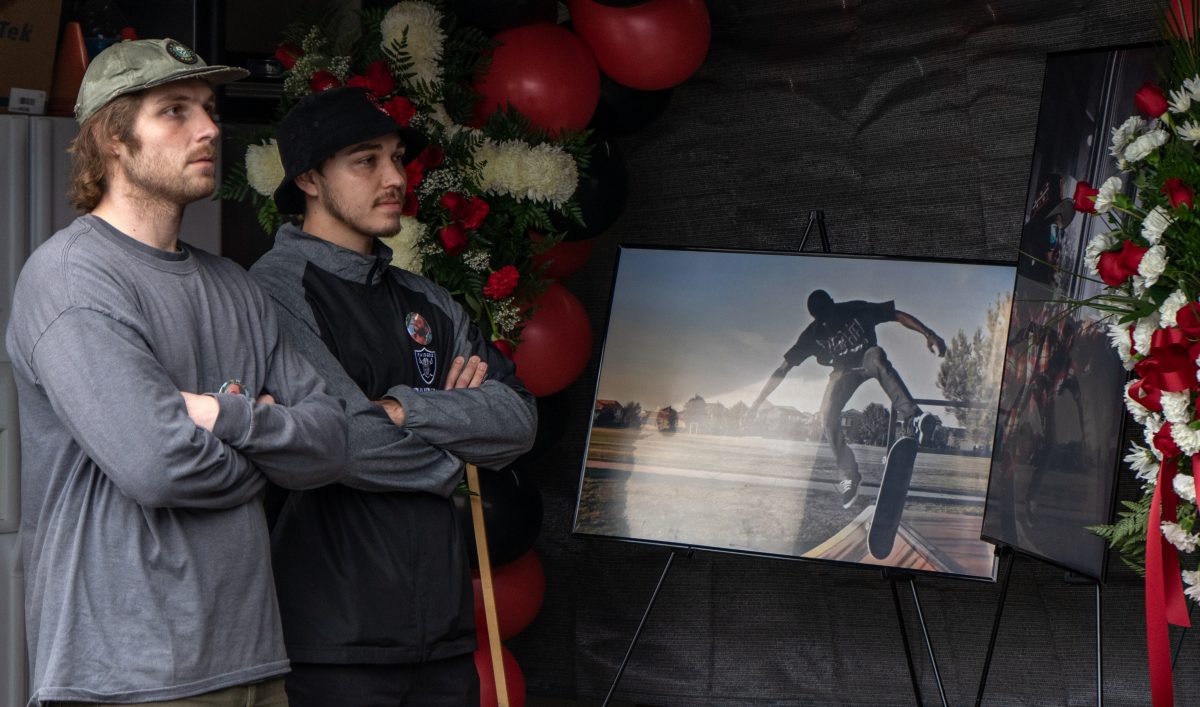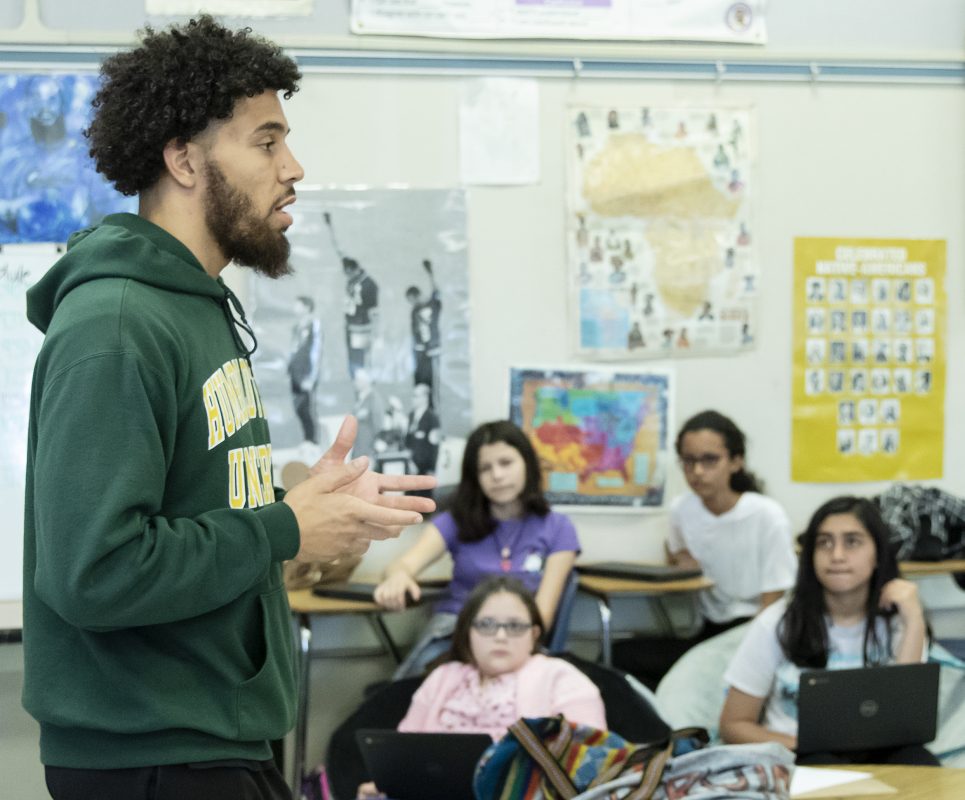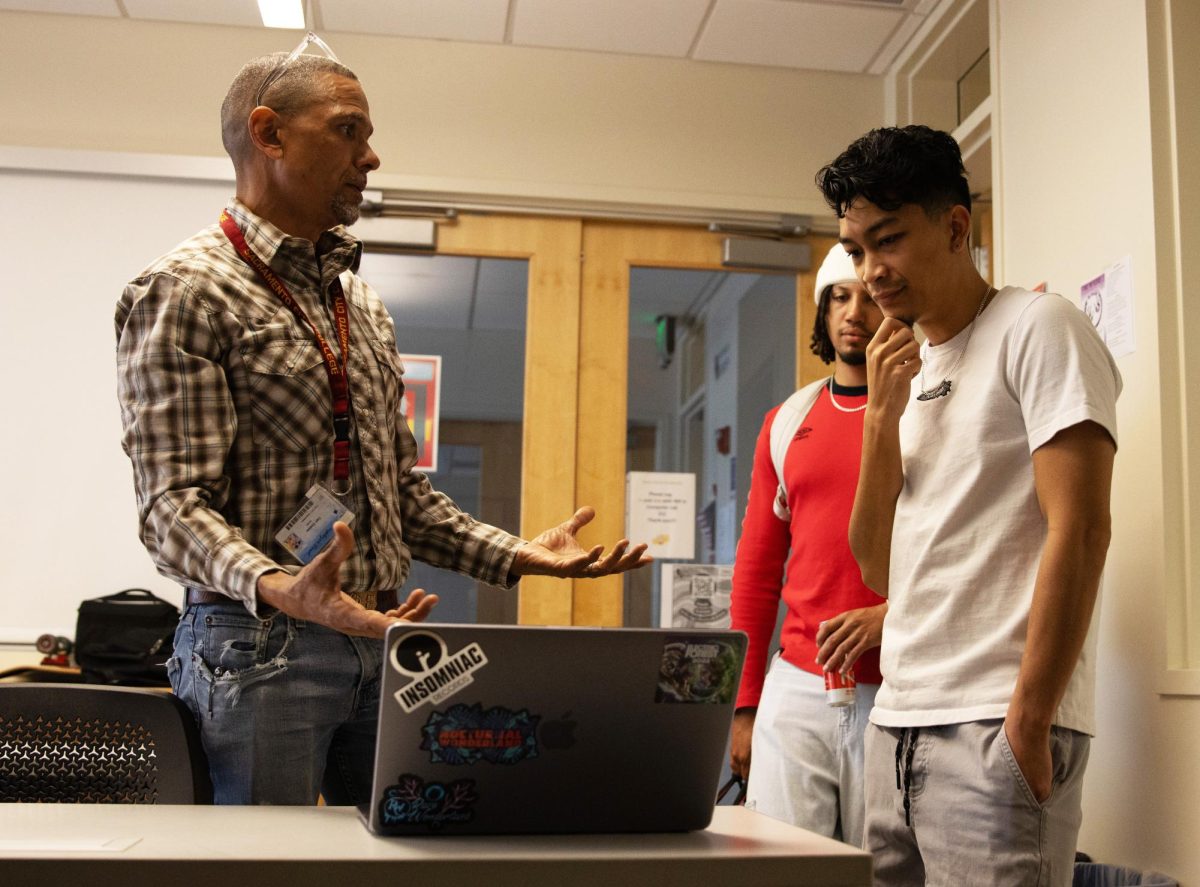As 22 students from Rio Tierra Junior High School enter the classroom, it’s abuzz with excitement. With rap music playing in the background, their teacher, Jordan McGowan, greets each student with a hug, a warm welcome or a joke.
McGowan is the Panthers’ football wide receiver coach as well as the head basketball coach at Rio Tierra where he primarily teaches history. Last year McGowan was asked to create and began teaching a journalism class for the middle school for the 2019-2020 school year.
He got the chance to do so because over the last three years teachers and administrators have been redesigning the curriculum, according to McGowan. There was an elective course that needed to be staffed, and Micah Simmons, Rio Tierra principal, asked if McGowan was interested in teaching it.
“For me, teaching an elective class was always going to be about empowering students,” McGowan said. “And I thought, what better way to get the students to utilize their voice than through being journalists?”
Before the redesign, if a student in the special education program had service support as an elective, they didn’t get to take another, Simmons explained. McGowan has seven students receiving service support, and under the new curriculum, for the last three years every student has been able to take two electives.
“We have [journalism], we have 21st-century skills, we have a MESA program where they don’t have to stay after school. [The class is] taken during the school day,” Simmons explained. “Some kids who struggle can do their reading intervention and still have an elective.”
Though McGowan doesn’t have a journalism background, he has had writing published—poems and opinion pieces. Still, he had to design a curriculum for the new class. Simmons, McGowan and the school’s counselor came up with ideas about what the class should cover and how it should be approached. McGowan reached out to friends who were journalism majors and researched topics covered in college journalism classes.
“It’s a treat and dynamic of him to want to put himself out there and explore all of these [journalism skills and concepts] and not have a set curriculum,” Simmons said of McGowan. “It’s important for our kids to realize that our world is full of so much information that you do have to peel back the layers and [determine] what is the actual factual stuff. I think that is what he [is] trying to do.”
•••
On a Wednesday afternoon in mid-March the students are working on the yearbook project that includes writing, photos and videos. The students sit in small groups, each with their own project to contribute to the yearbook. One group works on articles, another on photos and another on videos. McGowan walks around the classroom checking on each group, appearing pleased as he sees them diligently working and being self-sufficient.
Earlier in the school year the students started with print and photography work then started working on radio then video. The students produced their own video news program on a variety of different topics: school shootings, police brutality, gun violence, campus safety, dress codes and bullying. They researched, filmed and edited their segments with guidance from McGowan.
McGowan coached football at City College in 2013-14 and has been coaching now since 2018. He said that as a young coach at City College he learned a model of building relationships from the other football coaches.
“Seeing when I applied it for myself when I was a high school coach, it worked for my team, seeing those relationships form,” says McGowan. “That’s what I do in my classroom.”
Rio Tierra is a Title 1 school, which means that it gets supplemental funds to help its low-income students meet their educational goals, according to USLegal.com.
Because of the Title 1 designation, McGowan says, “There are so many negative things that come out about the school.”
He has been trying to change that image.
McGowan had met Sabrina Silva, a reporter with “Good Day Sacramento,” when she interviewed McGowan’s 10-year-old son who was rapping at the State Fair. McGowan contacted Silva on social media to tell her about his journalism class, and “Good Day Sacramento” highlighted the class in a video segment.
The idea of a journalism class being taught to middle schoolers intrigued Silva.
“When you see these kids being introduced to journalism and you see their interest, what he is doing at a young age is teaching them to respect the media,” Silva says. “He’s helping change the future of journalism.”
After their appearance on TV, McGowan notes, the students were motivated to produce more work. The students have worked on projects dealing with print media, radio and TV, as well as using social media to get their news out to the public on Instagram and through blogs and podcasts.
“They are creating content that they are proud of and see themselves in a positive light,” McGowan says. “For the community to see themselves in a positive light was really a great moment for a lot of the kids.”
McGowan says that he’s pleased about the connection the kids developed with Silva and how she has continued to stay in contact with them.
“[She’s] a journalist who looks like them, who is not from this country,” McGowan said. “They have someone they can be like, ‘Wow, I can look up to, I can talk to, she’s tangible. If I can do it you can do it.’ That’s what she always tells them. [She] came here not speaking English.”
•••
Despite its success and what it’s given students, the journalism class at Rio Tierra will end after this year, mostly due to budget constraints.
“It’s also due to [the fact that] we haven’t gotten the academic impact out of being able to spend an additional half a million dollars on top of your regular allocation of teachers,” said Simmons, Rio Tierra’s principal. “It’s not going away from the lack of kids wanting to do it, our displeasure with it or ineffectiveness of it. It comes down to budget and the redesign of the school.”
Some of the students in the class are eighth graders who will graduate this year. But NeLynn, a seventh grader who enjoys writing, was looking forward to taking the class next year.
“It makes you feel good helping out the group and like you can do anything,” NeLynn said. “He [McGowan] has a connection to the students, and if you get something wrong, he will sit down and help you. Other teachers will tell you what to do and walk away.”
Sabrina Silva agrees.
“I think that Jordan is an amazing teacher, these kids really love him,” she said. “I’ve had teachers like this in my past, and they’re teachers I’ll remember forever, [who] have made a big difference in my life.”
•••
As the news of the class’s demise hit the students, on March 13 they also learned that their school was closing because of statewide shelter-in-place policies to try to prevent the spread of COVID-19.
“There were a few kids in tears,” McGowan said over the phone about his journalism class. “It really sucks because we find out this is the only year we’re going to have this class and then for it to abruptly end.”
McGowan plans to try to finish the yearbook in the now-online school setting.
“It will probably end up being a lot of work on my end because the students won’t have the iPad or those resources,” McGowan said. “Even if we only have a journalism program for one year, we were able to produce this material. So now for it to be cut short is really tough.”
Rio Tierra is still in the planning stages of incorporating material for the online school environment, but McGowan has other concerns than just lesson plans. He doesn’t want to rush to think about content or standards. He’s more concerned about how his students’ personal lives are being affected by the school’s closure.
“One of the journalism students wrote me a message, and he’s been going back and forth with getting caught up in his family’s involvement in local gangs,” McGowan said. “He’s been trying to fight that fight, and being home he realized he didn’t want that. Other students are taking care of little brothers or little sisters. Now they are caretakers. That’s what some kids are going through.”
Whether on the field or in a classroom, McGowan sees himself as an educator. Even though Rio Tierra has temporarily transitioned to an online environment, he hopes his students have learned certain things from his class.
“I’m hoping that my kids take away that they know how to research and how to effectively use their voice,” McGowan said. “Whatever they feel or want to share with people, they have that power. They shouldn’t be silent. Their voices matter.”































